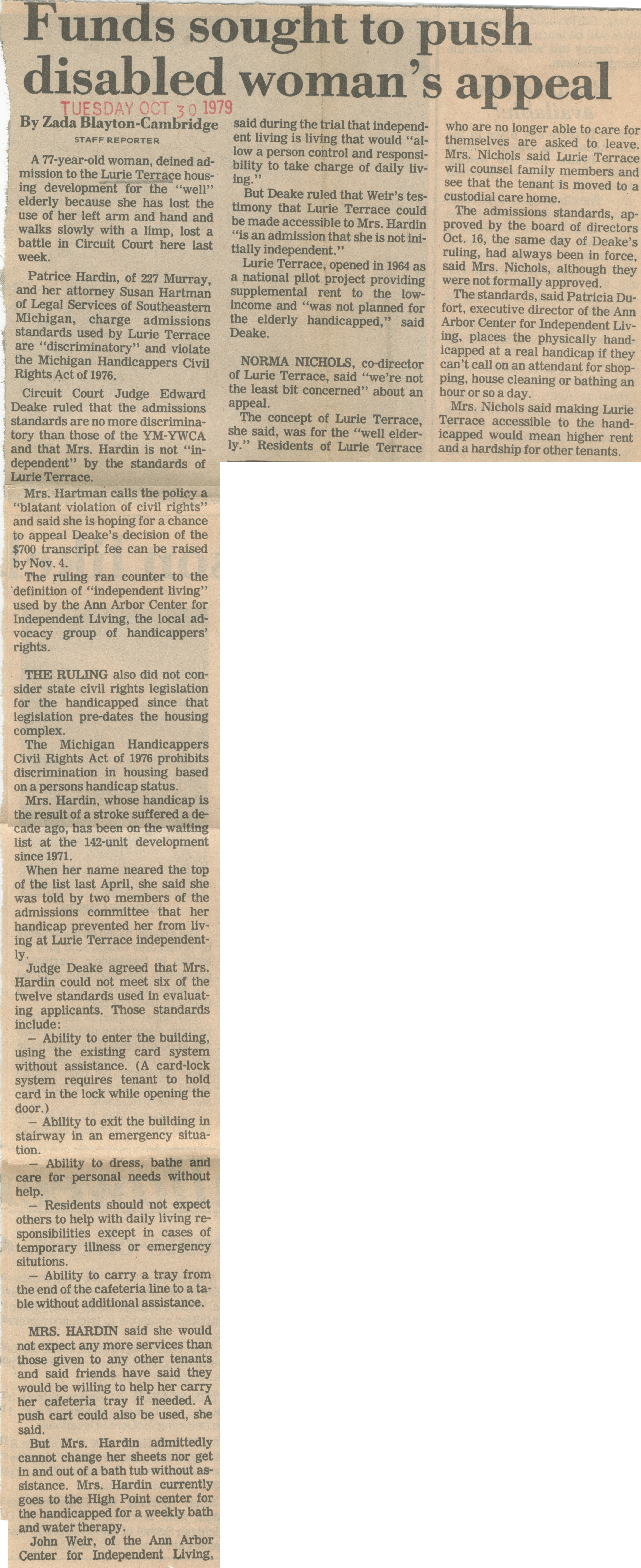Funds Sought To Push Disabled Woman's Appeal

Funds sought to push disabled woman’s appeal
By Zada Blayton-Cambridge
STAFF REPORTER
A 77-year-old woman, denied admission to the Lurie Terrace housing development for the “well” elderly because she has lost the use of her left arm and hand and walks slowly with a limp, lost a battle in Circuit Court here last week.
Patrice Hardin, of 227 Murray, and her attorney Susan Hartman of Legal Services of Southeastern Michigan, charge admissions standards used by Lurie Terrace are “discriminatory” and violate the Michigan Handicappers Civil Rights Act of 1976.
Circuit Court Judge Edward Deake ruled that the admissions standards are no more discriminatory than those of the YM-YWCA and that Mrs. Hardin is not “independent" by the standards of Lurie Terrace.
Mrs. Hartman calls the policy a “blatant violation of civil rights” and said she is hoping for a chance to appeal Deake’s decision of the $700 transcript fee can be raised by Nov. 4.
The ruling ran counter to the definition of “independent living” used by the Ann Arbor Center for Independent Living, the local advocacy group of handicappers’ rights.
THE RULING also did not consider state civil rights legislation for the handicapped since that legislation pre-dates the housing complex.
The Michigan Handicappers Civil Rights Act of 1976 prohibits discrimination in housing based on a persons handicap status.
Mrs. Hardin, whose handicap is the result of a stroke suffered a decade ago, has been on the waiting list at the 142-unit development since 1971.
When her name neared the top of the list last April, she said she was told by two members of the admissions committee that her handicap prevented her from living at Lurie Terrace independently.
Judge Deake agreed that Mrs. Hardin could not meet six of the twelve standards used in evaluating applicants. Those standards include:
- Ability to enter the building, using the existing card system without assistance. (A card-lock system requires tenant to hold card in the lock while opening the door.)
- Ability to exit the building in stairway in an emergency situation.
- Ability to dress, bathe and care for personal needs without help.
- Residents should not expect others to help with daily living responsibilities except in cases of temporary illness or emergency situations.
- Ability to carry a tray from the end of the cafeteria line to a table without additional assistance.
MRS. HARDIN said she would not expect any more services than those given to any other tenants and said friends have said they would be willing to help her carry her cafeteria tray if needed. A push cart could also be used, she said.
But Mrs. Hardin admittedly cannot change her sheets nor get in and out of a bath tub without assistance. Mrs. Hardin currently goes to the High Point center for the handicapped for a weekly bath and water therapy.
John Weir, of the Ann Arbor Center for Independent Living, said during the trial that independent living is living that would “allow a person control and responsibility to take charge of daily living.”
But Deake ruled that Weir’s testimony that Lurie Terrace could be made accessible to Mrs. Hardin “is an admission that she is not initially independent. ’
Lurie Terrace, opened in 1964 as a national pilot project providing supplemental rent to the low-income and “was not planned for the elderly handicapped,” said Deake.
NORMA NICHOLS, co-director of Lurie Terrace, said “we’re not the least bit concerned” about an appeal.
The concept of Lurie Terrace, she said, was for the “well elderly.” Residents of Lurie Terrace who are no longer able to care for themselves are asked to leave. Mrs. Nichols said Lurie Terrace will counsel family members and see that the tenant is moved to a custodial care home.
The admissions standards, approved by the board of directors Oct. 16, the same day of Deake’s ruling, had always been in force, said Mrs. Nichols, although they were not formally approved.
The standards, said Patricia Dufort, executive director of the Ann Arbor Center for Independent Living, places the physically handicapped at a real handicap if they can’t call on an attendant for shopping, house cleaning or bathing an hour or so a day.
Mrs. Nichols said making Lurie Terrace accessible to the handicapped would mean higher rent and a hardship for other tenants.
Article
Subjects
Affordable Housing
Apartments
Civil Rights
Courts - Michigan
Courts - Washtenaw County
Disability Rights
Fundraisers
Handicapped
Laws & Legislation
Lawsuits
Legal Services of Southeastern Michigan
Lurie Terrace
Senior Citizens
Ann Arbor Center for Independent Living
Ann Arbor YM-YWCA
Old News
Ann Arbor News
Patrice Hardin
Susan Hartman
Edward D. Deake
John Weir
Norma Nichols
Patricia Dufort